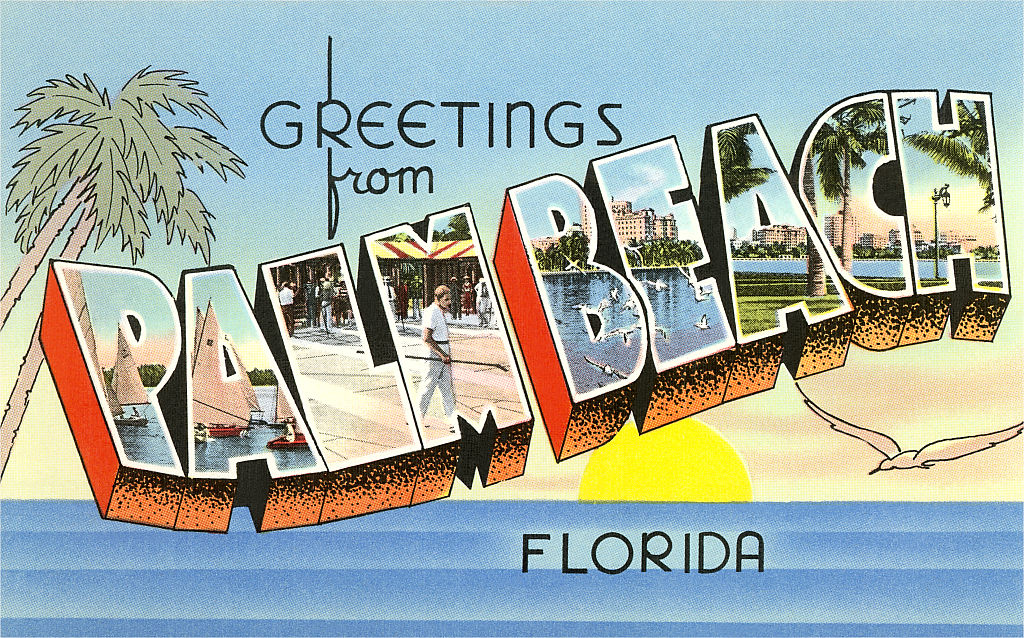Donald Trump continues to make news in his hometown. This is what you would expect, but it’s not all plain sailing. For a start, since he won the election, and the local police started declaring his Mar-a-Lago Club a security zone – which stretches for seven blocks, north to south, and from the Atlantic Ocean to the Intracoastal Waterway – no fewer than seven properties in the zone have changed hands. And the big question is: are these people moving in, or moving out?
It is impossible to be certain, of course, but we do know that the latest property sold for $16.99 million, down from an asking price of $24 million when it first came on the market. Read into that what you will, but when Trump is in residence, the whole area is cordoned off by police who limit traffic only to local residents, their staff and workmen. Everyone else has to divert via the mainland, adding a good 30 minutes to the journey. And this heavy police presence is having a marked effect on the finances of the local council, which has asked Congress to reimburse it for the extra expenditure needed when Trump is in town, as happened during his first term in office, though the council has not yet received an answer.
Not on the menu yet, but maybe soon, could be python
In the meantime, it is having to consider some unpalatable charges, such as beachfront parking fees (at $4 per hour); hourly fees for youth sports organizations to use athletic fields; increasing admission prices to local museums and maybe even a rise in property taxes. Unsurprisingly, there has already been some heavy pushback.
It shouldn’t matter too much in the long run. Figures just released show that the taxable property value of Palm Beach County has surged by an incredible $141 billion since 2020. Since tax rates typically range from $18 to $20 per $1,000 of taxable value, that means an annual tax-take, if my sums are correct, of $2.8 billion extra.
And the good news continues. Palm Beach International Airport, where 65 percent of traffic is private, is growing – extending its south runway from about 3,200 feet to a massive 8,000 feet. Otherwise, says airport director Laura Beebe, they would have lines of private aircraft waiting to depart and that, of course, is not part of the private aircraft experience.
Slate Airlines, incidentally, has just announced a new route from PBIA to Nantucket, the summer home of many Palm Beachers. It has also joined forces with Buccan, a local restaurant recently frequented by Trump’s children and Taylor Swift, which provides stylish onboard snacks.
Less exalted than Buccan is Clematis by Night, a weekly music festival held every Thursday and centered around Clematis Street on the mainland, an area full of restaurants and theaters where local bands can try out their songs and pick up tips from others equally new to showbiz. Residents say the festival, which started on a whim, has survived partly because it never rains on a Thursday. Although it doesn’t rain much in Palm Beach full stop.
Palm Beach being so in love with itself, a recent survey asked what billionaires eat for lunch or dinner. Some of what follows will be surprising, some not at all:
- Veal scallopini
- Branzino with potato
- Le poulet cajun
- Beef carpaccio sandwich
- Neptune kebab
- Yellowtail snapper almondine
- Crispy rice hamachi
- Pappardelle with wild mushrooms
Not on the menu yet, but maybe soon, could be python. Monster Burmese pythons were first identified in Florida’s Everglades National Park in 2000. No one knows how this invasive species arrived, but according to the specialists they are “slithering north.” They may even have reached Georgia. As a result, each year the Florida Python Challenge, a ten-day event to remove these beasts, is mounted in the Everglades with $25,000 of prize money to be won. This year was exceptionally effective: a 16ft, eight-inch-thick python weighing 105 pounds was caught. There are strict, scientific rules about how they must be killed: by shooting bolts into the part of the brain called the cerebellum, rather than using firearms, to produce the immediate loss of consciousness (this is called “pithing”).
Still on rare invasive wildlife, the capture and sale of green iguanas is now allowed in Florida, after they were once proclaimed a prohibited species. It is legal to kill and eat iguanas, but illegal to import them. It is frowned upon to keep them as pets and the ways to kill them vary between localities, but most people regard them as vermin. In some areas they are so hated there are morning patrols to shoot them.
One of the Clematis by Night bands even has a song about them.
This article was originally published in The Spectator’s August 2025 World edition.


























Leave a Reply